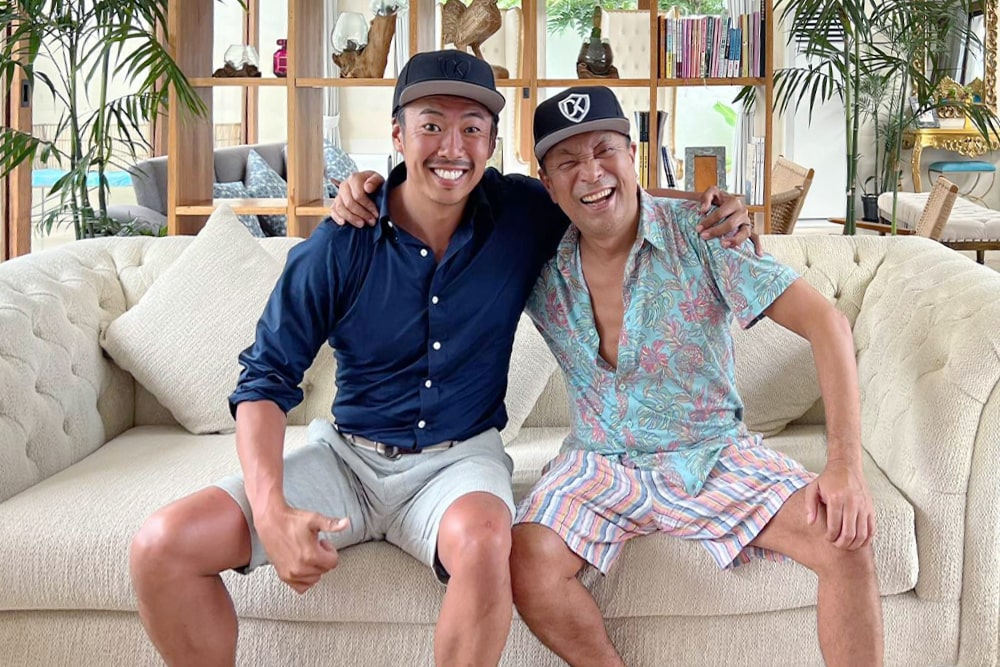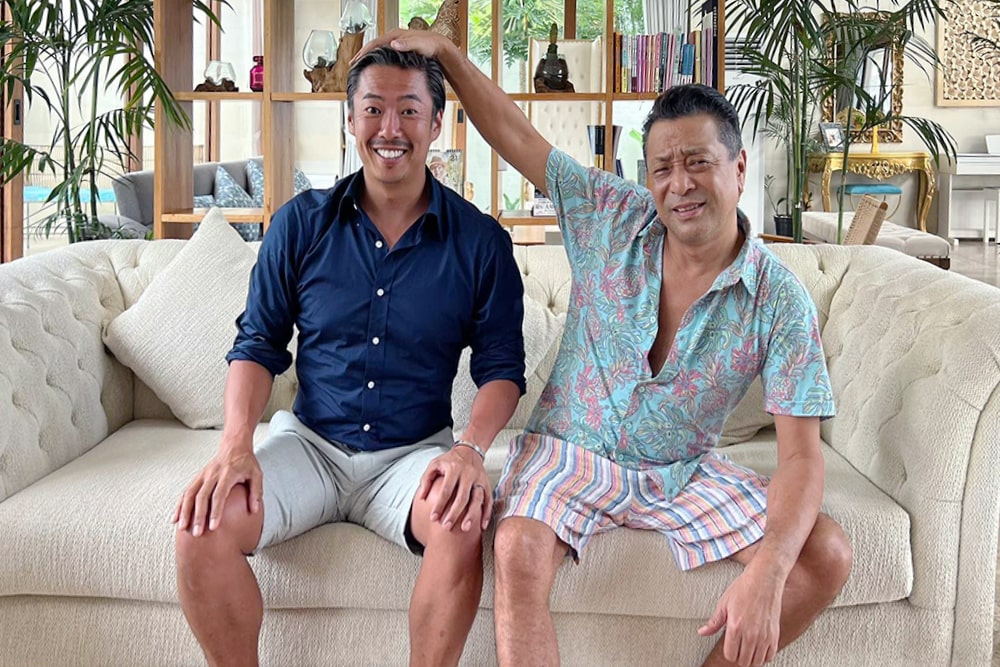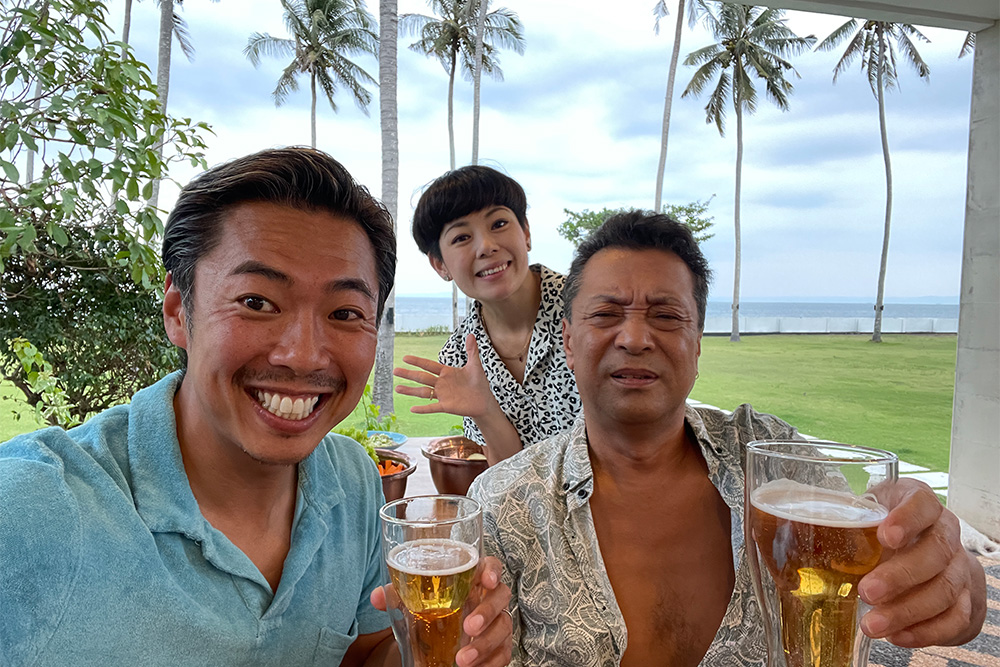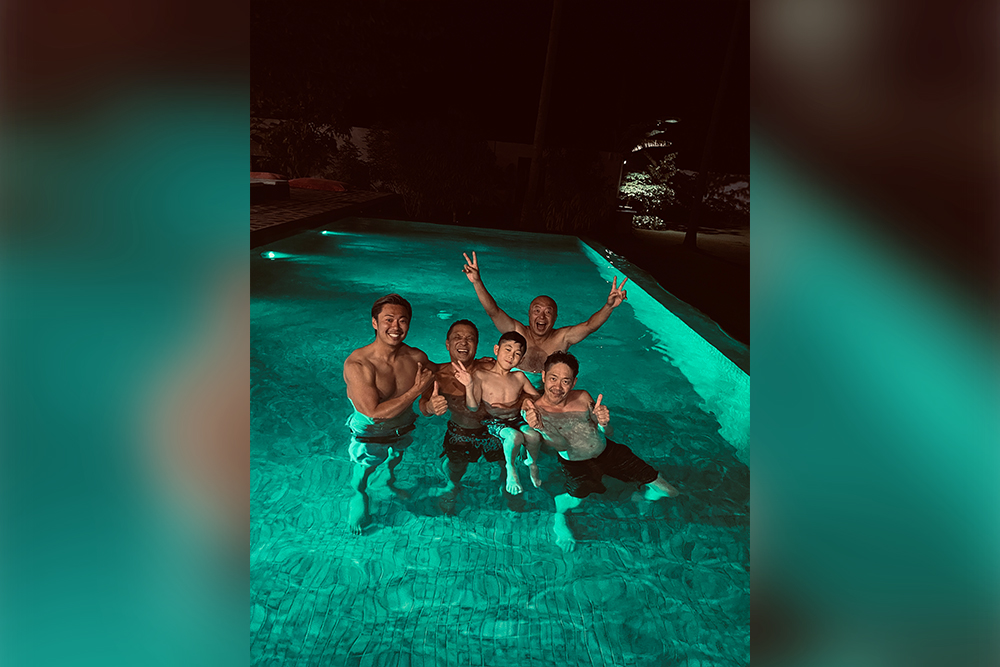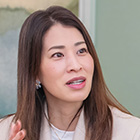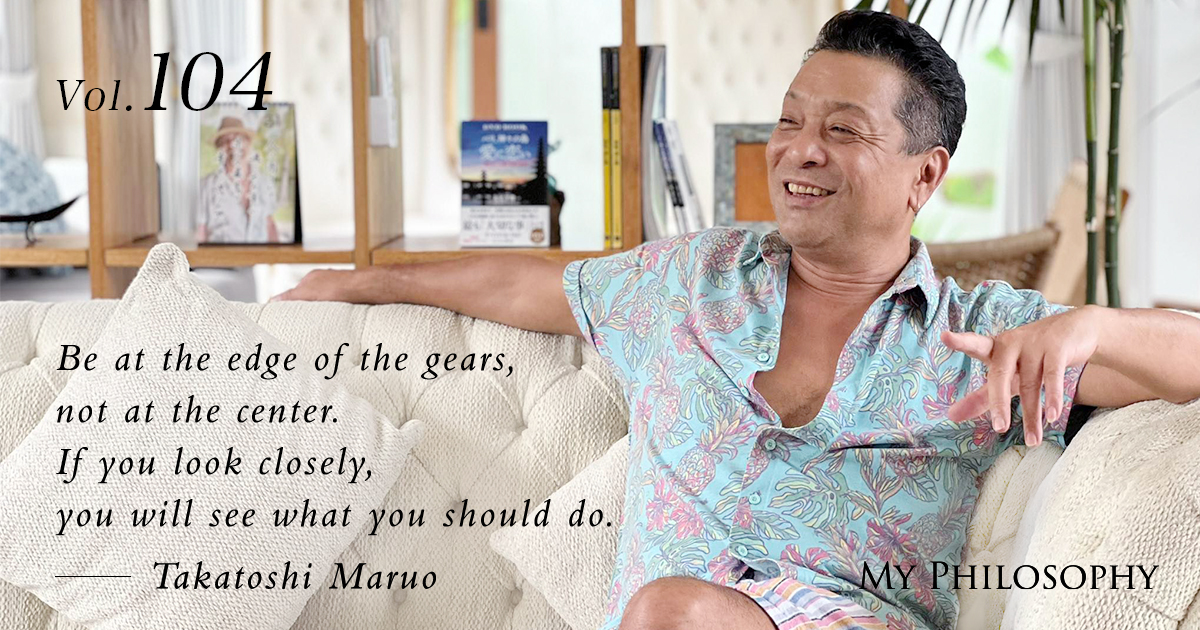
Looking back on his own success in becoming a billionaire through his abilities regardless of his academic background, Takatoshi Maruo has gained the sympathy of many people by teaching the importance of "earning power" as well as how to be a good person and the importance of moral values. Many young people visit Bali because of his generous contributions to society, and he is affectionately called "Bali's Aniki (Big Brother)". What message does Aniki send to Japanese who have lost their vitality?
Profile
Vol.104 No.104 Takatoshi Maruo
"Bali's Aniki (*Big Brother)"
Born in Osaka prefecture in 1966, Takatoshi Maruo began living alone with his father in 1969. After graduating from middle school, he worked as an apprentice for a signboard company. He later worked for Yoshimoto Kogyo and a transportation company before moving to Bali, Indonesia. He became successful in real estate and leasing after selling a piece of land that was given to him by a Balinese friend as repayment for a loan for a much higher price. He donates to schools and hospitals in Bali and provides funding for traditional orchestras. He is now called "Bali's Aniki (*Big Brother)" or "Mr. Maru" and is popular among the local people.
He has authored several books including "Earn a Fortune by Working Abroad" (co-authored with PHP Kenkyusho), "The Rules of Absolute Success for Millionaires" (co-authored with Nihon Bungeisha), "Cheerful, yet Alone" (co-authored with Banana Yoshimoto and published by Gentosha), and "The Teachings of Millionaire Aniki" (published by DIAMOND, INC.).
Visit the official website of Bali's Aniki
DMM Online Salon: Aniki Resort Life
Go outside and see the world.
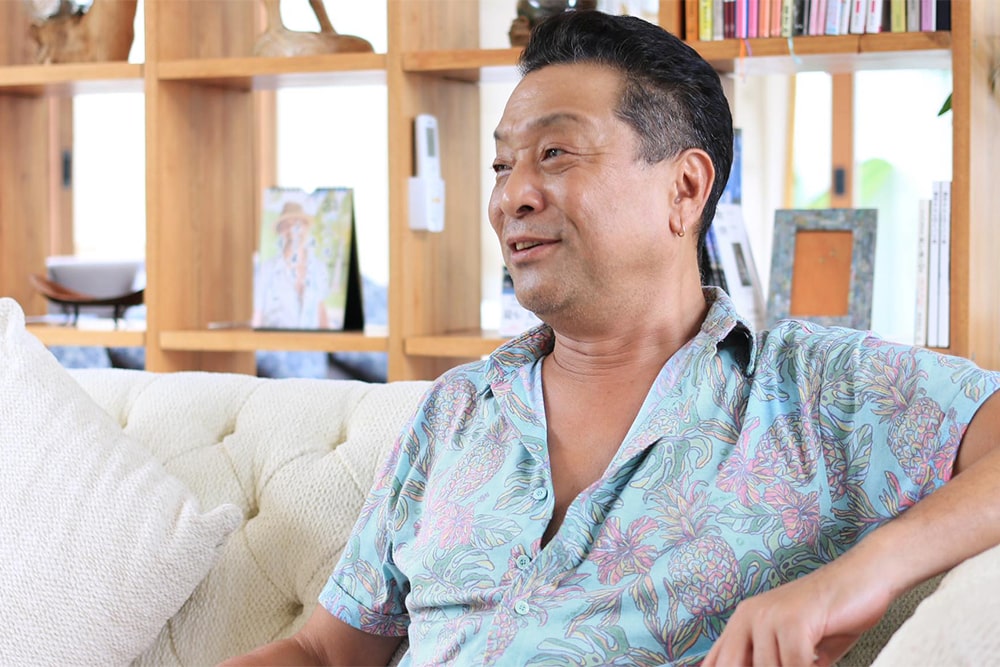
I went to Bali alone when I was 28 years old. By my 30s, my related company had grown significantly, and by my 40s, I was not only involved in hotels, products, and factories, but also leasing farmland. In my case, I bought land, rented it out, and eventually turned it into residential land, and that’s how I grew big.
Nowadays, building homes has become a hobby of mine, and I’m surrounded by them everywhere I go. Recent young Japanese people, due in part to the coronavirus, tend to stay indoors and say that playing games at home is the happiest thing, but I don’t understand the meaning of that. In such a situation, I think “Japanese people are in trouble.” We need to go outside and see various things. That’s what we need to change.”
Break free from theory
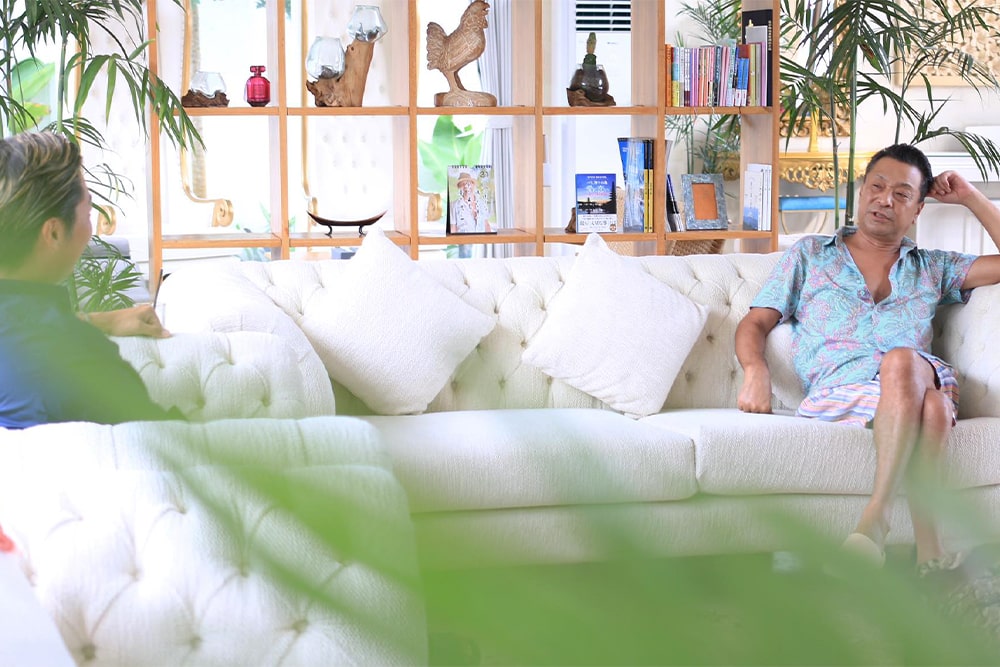
The strong people in life are those who know how to make money. This is by far the strongest skill. No matter how poor you become, this skill remains strong. The reason for this is that those who earn money don’t need to save money. They don’t even need to take out insurance. If you’re earning money, you don’t need savings or insurance. Only those who can’t earn money worry about insurance.
About 70-80% of people in the world save 50,000 yen a month, and after one year, they have saved 600,000 yen, and after ten years, they have saved 6 million yen. But that’s nothing compared to someone who earns 6 million yen per hour. So, those who understand how to make money are always superior. Therefore, it is important to observe and learn from those who know how to make money. There’s no point in just looking at rich people. It’s like wasting time watching someone who won the lottery. It’s also pointless to watch someone who inherited 1 billion yen. There are so many Japanese people like that.
Unfortunately, there are not many people who truly understand how to make money. There are many people who do what society considers good, but surprisingly few people understand how to make money. There are people in Japan who know how to make money, but they are few in number. They only know their own way of making money. Many business owners have been running their companies for many years and have been thinking about how to make money for the company as a whole, but they have not been able to make it their own.
The reason for this is that they learned everything about business from 1 to 10 in order and can’t break away from those theories. They are stuck with the established concepts. That’s why they say “generally speaking” about everything. To me, it means, “You like general things, so you’re still poor.” I hate general things. I have friends who graduated from the University of Tokyo and Harvard. But what’s the point of going to those schools if you like general things? It’s meaningless. I think they went to those schools because they hate general things.
Even if you graduate from a prestigious university, you may not be able to make money because you will get stuck in the center of the company’s gear. If you’re in the middle of the gear, you can’t break free. But if you’re at the edge, you might be able to make it. So, at least try to be on the edge. The rate of high school dropouts becoming billionaires is high in the world because they were on the edge and could see many things. If you have the power to earn money, you can climb as high as you want.
Learn from those who can’t earn.
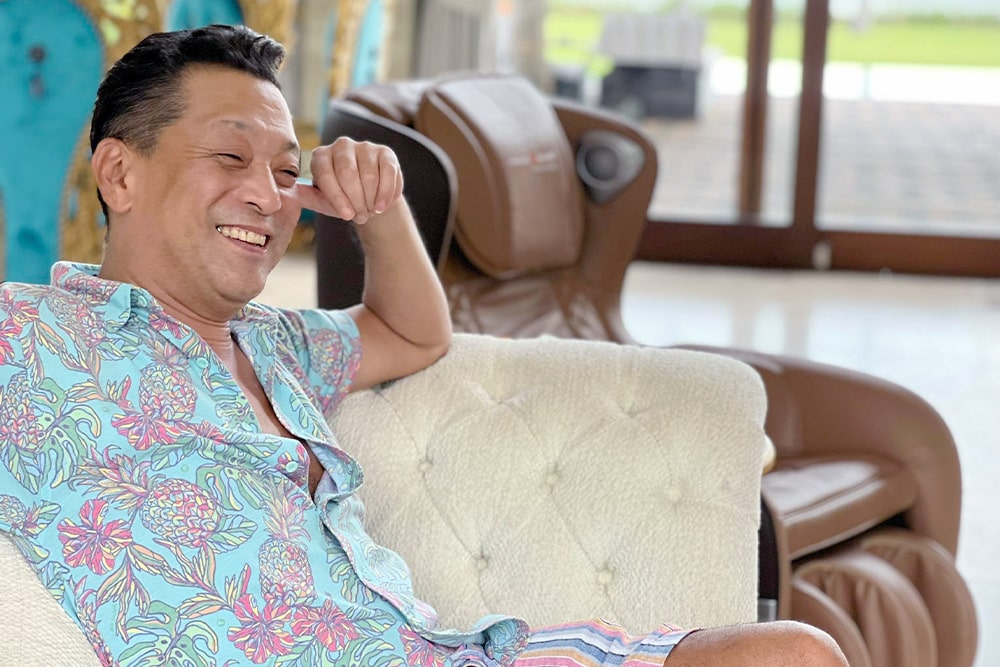
It’s important to study people who aren’t making money. Everyone chases after those who are successful, but they won’t teach you anything. So instead, first explore why someone isn’t making money in the first place. That’s when things become clear. Other people can be a negative example. You don’t have to do what they do. You can go in the opposite direction and still succeed. That’s why if you’re only going to spend money, don’t go to university. If you want to turn your experience into money quickly, it’s fine to only have a middle school education.
I started my apprenticeship after middle school, but what’s amazing about having only a middle school education is that you believe you’re at the bottom. You think, “My classmates went to high school or university, I’m no good, I can’t beat them,” so you say, “Please let me do anything.” Through learning from my superiors, I served them and they nurtured me in return. As a result, I can do a lot of things. I can say things like, “You’ll make money if you do this” or “You won’t make money if you do that,” because I’ve seen so many things. There are also many people around me who have failed, so I know what it takes to become wealthy or not. I didn’t try to save money, I was just serving my superiors, but money accumulated as a result.
It costs money for education and living expenses until middle school graduation, and if you go to high school and university, it will cost many times more. If a turtle starts seven years ahead of a rabbit, no matter how hard the rabbit tries, it can’t catch up to the turtle. It’s better to start early. Even people like university professors or those in doctoral programs come to me, but they’re not making any money. They talk about buying a house, but when I ask, “Isn’t that debt?” they say, “Of course, it’s a loan.” That’s not really theirs. Those are the types of people who are aiming for a home run, and they have an image that those who only have a middle school education are falling apart at the edges. They think, “Middle school graduates are no good,” but it’s worth considering which lifestyle is more free.
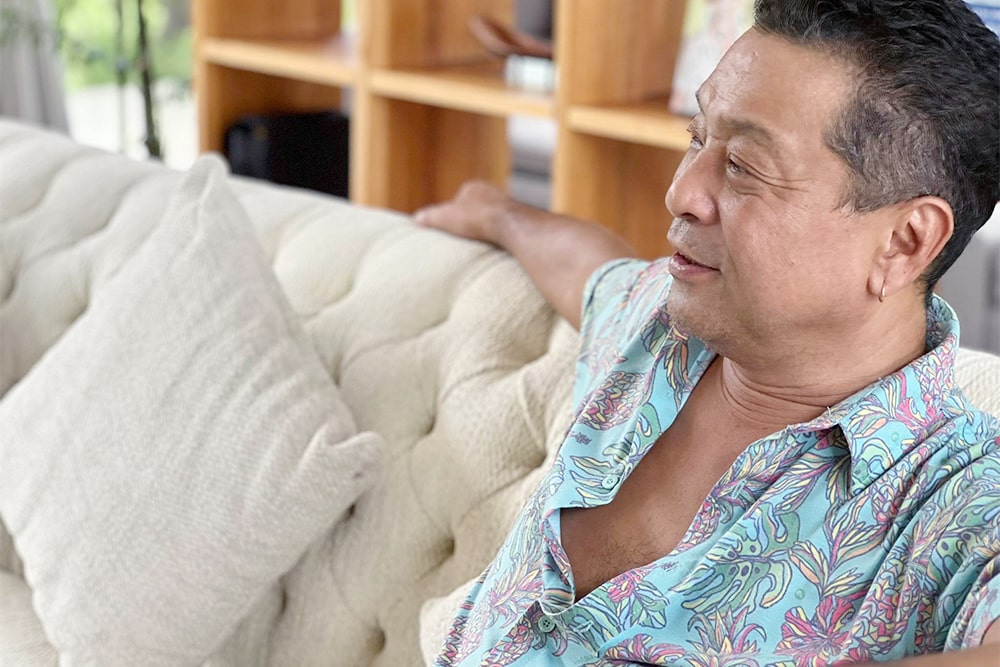
The power to earn money is actually something that is inherited or passed down, in other words, something that is bestowed upon you by others. I don’t think you can learn it yourself or catch it on your own. Whether it’s someone I’ve seen potential in or someone I’ve just assumed has potential, if that person tells me to go somewhere, I’ll go. That’s important. It produces good results. When I was young, I did this. When a senior who owned hundreds of buildings told me to meet someone, I went and got a job worth tens of billions of yen from that person. People are all about being seen as having potential and being expected to succeed. If you’re not seen as having potential, it’s over.
Even though people in Japan may say that the way of thinking is different when I tell this kind of story, I want everyone to become a member of Japan’s future. I want them to have the recognition that they will support Japan no matter what. I want them to meet different people, convey what they have heard, and pass it on. First of all, young people today don’t have the attitude of taking what their seniors say and interpreting it in their own way. Yet, they say they want to become big or successful. But that’s impossible. If I were to explain why, for example, if they were to sincerely take in what their seniors say and recognize that both Japan and themselves are in a precarious situation, they should start learning. Then they should work hard for that. If they make an effort, they can learn more advanced things from their seniors. That’s how they become big. However, they don’t do that. Moreover, few of these young people even think about trying to reach that level.
Happiness is peace
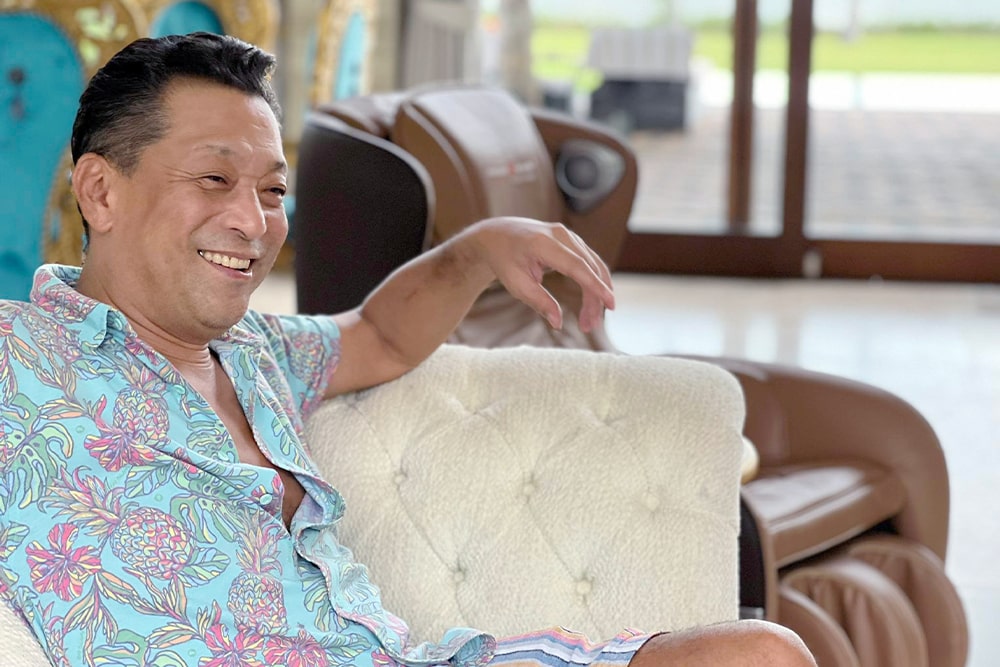
It is said that Japanese people have low levels of happiness, but that is because they equate happiness with money. The less people have this kind of thinking, the higher their level of happiness. Go to Africa and you’ll see countries like Congo and Somalia, which have political complexity, but Somalia equates happiness with peace, not money, and as a result, their happiness level is very high. In reality, happiness is peace. The countries that believe peace is happiness are the happiest. Even if they are poor, everyone can still smile. In Japan, if you are poor, you can’t smile, and that’s why they’re not happy. That’s the key point. In Japan, it’s impossible to enjoy being poor. Laughing in difficult times is important.
What’s important is how we live as human beings and our morals. The Showa era, which lasted from 1926 to 1989, was a time in Japan when many adults were involved with children, and the children learned how to interact with adults.
From there, they learned manners and morals, and just being smart wasn’t enough to get people to pay attention to them. Today, it’s difficult to teach people with no moral compass, and it’s hard to do through Japanese-style education. It’s important to take children outside and let them meet many good adults, not just their parents, through festivals or community activities. There are too many parents who leave their children alone to be children.
Go outside and see the world!
DK Sugiyama has come a long way to visit me in Bali. I met a guy with a backbone for the first time in a while. He charges ahead with reckless abandon. He is literally a “selfless” man. This kind of man may change Japan and the world. In a world with only two choices, to go or not to go, to do or not to do, he is a man who keeps rowing the ship of true supreme leadership. His wide opened eyes could become Japan’s trump card. I have great expectations and am grateful to have met DK!
Aniki Wakyo,Takatoshi Maruo
I had always wanted to meet the “Aniki” in Bali, and when I arrived on a business trip, I contacted him for a direct interview appointment. The next day, I received a call from Aniki, which made me very happy! After exchanging various information, he invited me to his home. It was truly an encounter with Aniki by taking action.
I had read his books and watched his movies before, so I was looking forward to meeting him. I was able to spend two whole days together and received life and business advice from various perspectives. He taught me that by acquiring the skill of “earning,” one can survive even when the world changes. Of course, it is necessary to “change” according to the times and environment, but he taught me the points for living and helped me to enhance my potential.
I was moved by Aniki’s kind consideration and actions, and I also wanted to do more activities to make people happy. Aniki, when I go to Bali again, I will go with my friends, so let’s have a great time again!
November 2022, at Aniki’s villa in Bali. Editor: DK Sugiyama, Writer: Kyoko Ayukawa, Photographer: Hiro Wakyo.




